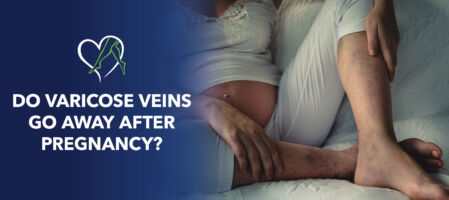
Varicose veins occur when blood vessels close to the surface of the skin, known as superficial veins, become twisted and bulge. These typically form in the legs, affecting approximately 23 percent of adults in the US, as per the AHA Journal Circulation.
Although they generally don’t pose any major health risks, they can certainly be uncomfortable and occasionally lead to more serious venous conditions.
Women are already at a higher risk of developing varicose veins, but empowering yourself with the knowledge of venous insufficiency signs during and after pregnancy involves managing your expectations surrounding their onset, severity, and treatment. While Center for Vein Restoration providers can give you personalized advice based on the progression of your specific symptoms, understanding the basic relationship between varicose veins and pregnancy will help prepare you for all that your postpartum journey brings.
Varicose veins are caused by the weakening of blood vessel walls, usually in the lower half of the body. When blood moves through the vein, it expands and stretches, resulting in a backup of blood and the onset of a reddish or purplish color. Aside from cosmetic changes, the affected area and nearby muscles may become sluggish, sore, heavy, itchy, or swollen, according to Penn Medicine.
When breaking down the root causes of varicose veins during pregnancy, it’s important to remember that the body is already experiencing many complex hormonal changes throughout this time. Many of these are also common risk factors for developing varicose veins, which means pregnancy only increases the odds of developing problem veins. For example, pregnancy causes an increase in progesterone, a hormone that decreases valve functioning and relaxes walls in the blood vessels, as per the Cleveland Clinic.
Being pregnant also boosts the amount of blood in the body, putting increased pressure on the pelvic blood vessels as blood flows upward and back toward the heart. Other varicose vein risk factors to keep in mind during pregnancy include excess sodium and lack of fiber.
The best way to avoid the potentially uncomfortable symptoms that come with varicose veins during pregnancy is to avoid them altogether. Preventing varicose veins during pregnancy involves improving circulation by:
If you still have concerns, talk to your Center for Vein Restoration vein care specialist about compression socks for pregnancy.

Varicose veins are particularly common during the third trimester of pregnancy. As mentioned, they typically occur in the lower half of the body, including the legs and ankles. Pregnancy also increases the risk of varicose veins developing around the anus or in the rectum. These are called hemorrhoids, which can also be caused or worsened by constipation during pregnancy.
Relieving the symptoms of varicose veins is focused on removing their root cause: pressure. Moving around frequently and wearing compression stockings will continue to be helpful. An ice pack or cool compress can also help decrease swelling when applied to the affected area. A vein care specialist can provide personalized recommendations based on your medical history, the severity of your symptoms, and other details about your specific situation.
Fortunately, pregnancy-related varicose veins often aren’t considered dangerous and will likely improve after you give birth. Therefore, healthcare providers don’t treat problem veins during pregnancy. However, you can keep your venous health in mind during and after your pregnancy by taking steps that will lower your risk of developing varicose veins or worsening your current venous insufficiency condition.
We’ve talked about how varicose veins typically aren’t dangerous — but there are times when their symptoms overlap with a serious condition that does require urgent treatment, according to the Cleveland Clinic. In some cases, they’re indicative of a progressive disease and require ongoing medical care. It’s recommended to seek treatment when symptoms progress to bleeding from an affected vein or open sores on the skin near the varicose vein. Stay alert for signs of a blood clot, which include worsening redness, pain, and swelling in one leg.
While varicose veins usually shrink between two to three weeks after you give birth, they often return with subsequent pregnancies and have a longer recovery period.
They can also come with more severe symptoms and be more difficult to treat. Keeping this in mind, it’s reassuring to remember that varicose veins ultimately are not harmful to your baby despite the uncomfortable symptoms that can accompany them. They’re simply one of the many temporary physical changes your body undergoes during pregnancy.
Pregnant or not, it’s crucial to recognize the small steps you can take to help you find varicose vein relief and manage your symptoms throughout your day-to-day life:
Ultimately, if varicose veins are preventing you from feeling your best during your pregnancy, our vein treatment experts are here to provide a personalized consultation and communicate with compassion every step of the way. We can also make sure your varicose veins aren’t a sign of a more serious medical problem requiring urgent care during or after your pregnancy.
Let Center for Vein Restoration (CVR) help you manage uncomfortable symptoms and achieve the physical and emotional well-being you deserve. Call our hotline today to schedule an appointment and explore your treatment options at 240-512-4945. You can also schedule ONLINE.
